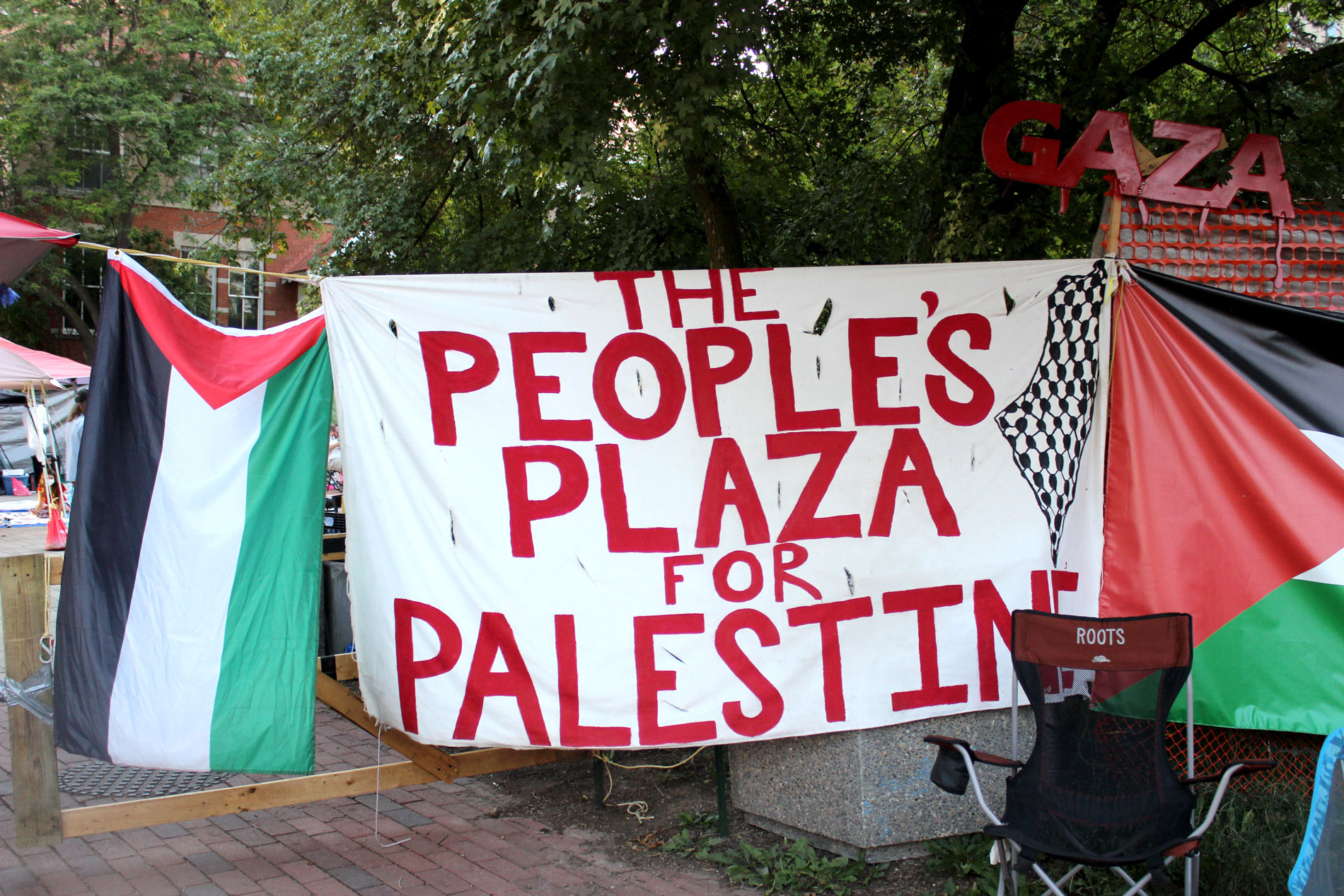GUELPH – For over seven weeks, students have camped at the University of Guelph (U of G), where dozens of tents are set up within a barricade cloaked in flags and banners.
But by July 15, the encampment is set to disappear.
They call it the People’s Plaza for Palestine, and their goal is to push the university to divest from weapons manufacturers and other corporations they see as complicit in “the occupation and genocide of the Palestinian people.”
The group behind the encampment, U of G for Palestine, states the university disclosed holding over $50 million in companies complicit in “Isreali occupation and genocide in Palestine,” and more than $5 million in “at least 21 large arms, defense, and military contractors.”
In late spring, students and university admin negotiated and the school agreed to annual disclosures of all investment amounts and to form an ad-hoc committee to explore divesting, weighing factors including investments’ complexities and how divesting would impact return.
But negotiations stalled on June 7, falling short of the students’ demand for a commitment to divest.
Eviction
A month later, on July 6, students received an eviction notice – with about 24 hours to vacate.
U of G president Charlotte Yates states “The encampment members’ exclusive use of campus space is making it impossible for the university to maintain an inclusive campus and fulfill our commitment to create an environment where everyone can study, work and live without discrimination, harassment or intimidation.”
Student protestor Waida Mirzada told the Advertiser this “portrays us in a way that is, quite frankly, the opposite of everything that we stand for.”
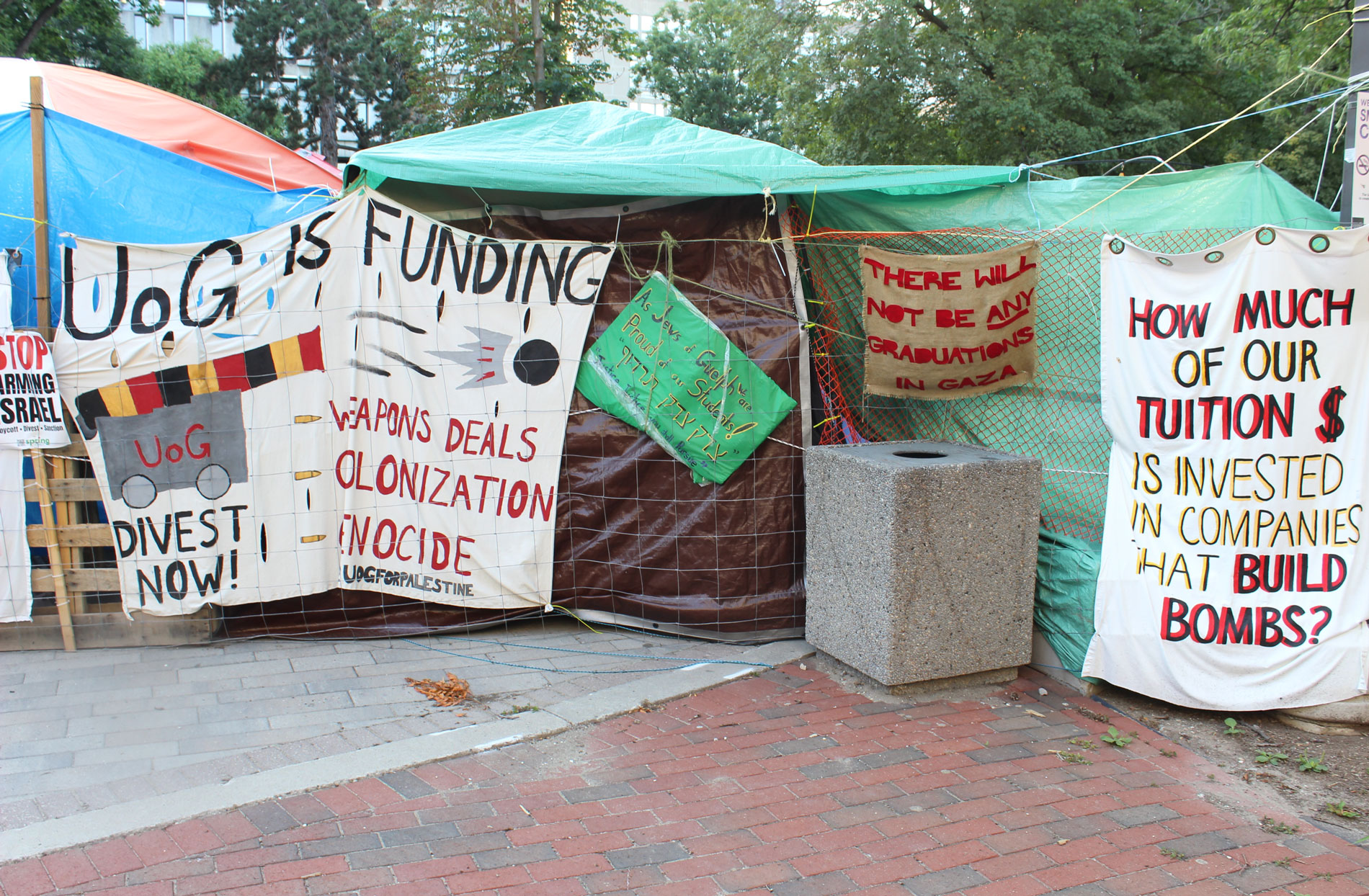
An encampment at the University of Guelph has been set up since May, and includes banners with slogans connecting the university to the violence in Palestine.
The group’s rules, which are posted and read aloud frequently, include prohibiting “any form of harassment or discrimination.”
Orton resident and Independent Jewish Voices (IJV) member Ayella Grossman told the Advertiser the encampment is one of “the most peaceful, welcoming spaces I have ever been in as a Jewish person in Canada.”
She has experienced antisemitism in her community – at times she hesitates to put up Hanukkah decorations “because I don’t know the opinions of my neighbours.”
But Grossman insists there is none at the encampment. “Anyone who believes there is antisemitism at these encampments should go and see it for themselves,” she said.
“The people that are inciting violence … are the people that are supporting Israel and come to the encampment to protest it,” Grossman added.
“We have experienced physical assault, harassment, discrimination, transphobia, homophobia, Islamophobia,” Mirzada noted – incidents reported to university officials “who have done nothing to even acknowledge it.”
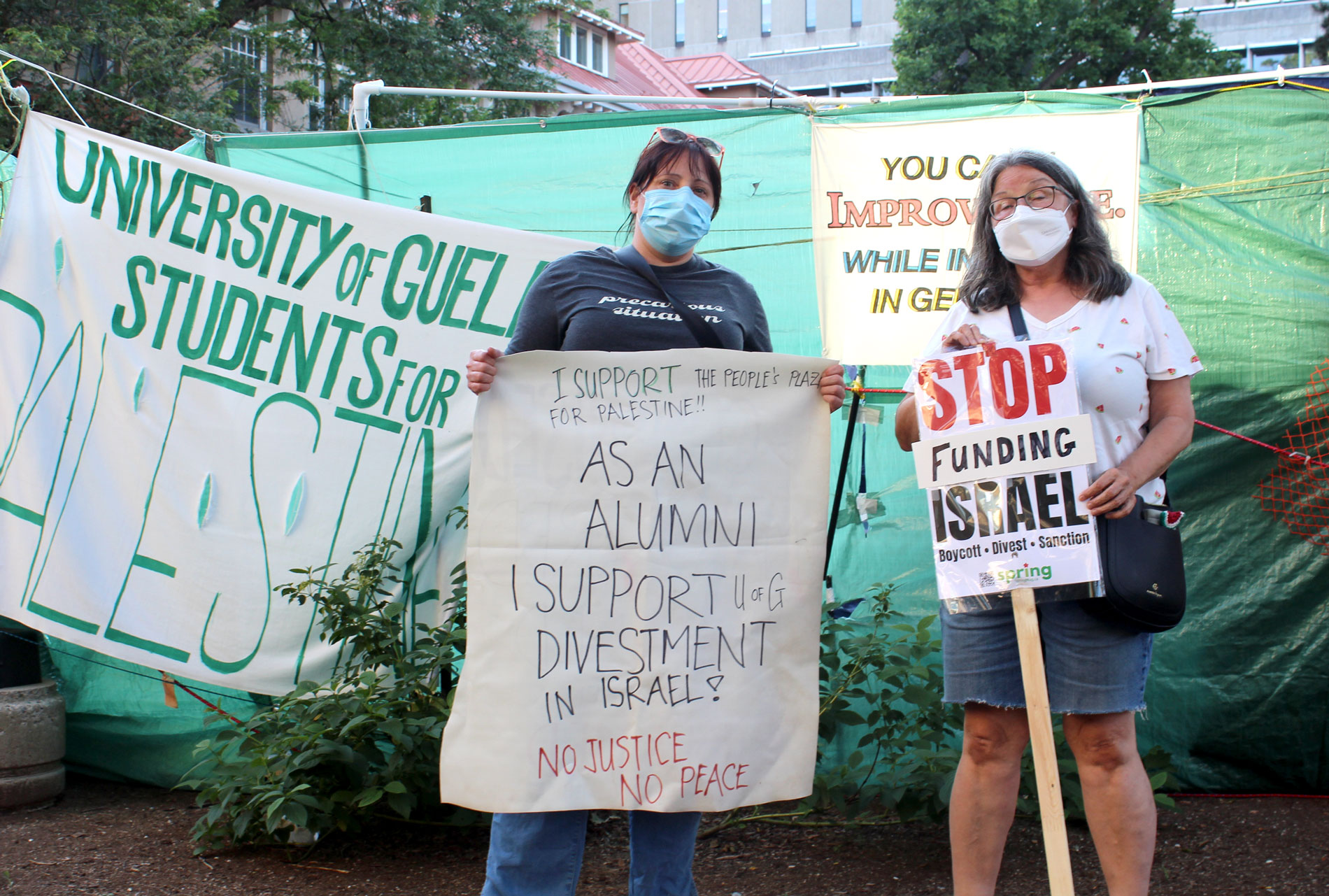
Krysta Wordock, left and Juanita Burnett are two of the people who showed up in support of the student protestors after the university issued an eviction notice.
Trespass notice
When the eviction deadline came at 8pm on July 7, no attempts to disassemble had been made, and about 150 people gathered, including members of IJV, Interfaith Justice, CUPE 3913, and U of G Alumni for Palestine.
A single campus police vehicle parked about 50m away, but officers did not approach.
The following morning, a legal notice of trespass was delivered, prohibiting students from “occupying, entering, or remaining” in the plaza without authorization; “erecting, installing, or maintaining unauthorized tents, shelters, equipment, or other structures on University of Guelph property; … occupying, or gathering or remaining at University of Guelph property … between the hours of 11pm and 6 am, unless specifically authorized; and … gathering at University of Guelph … without authorization or in a manner inconsistent with University of Guelph policies.
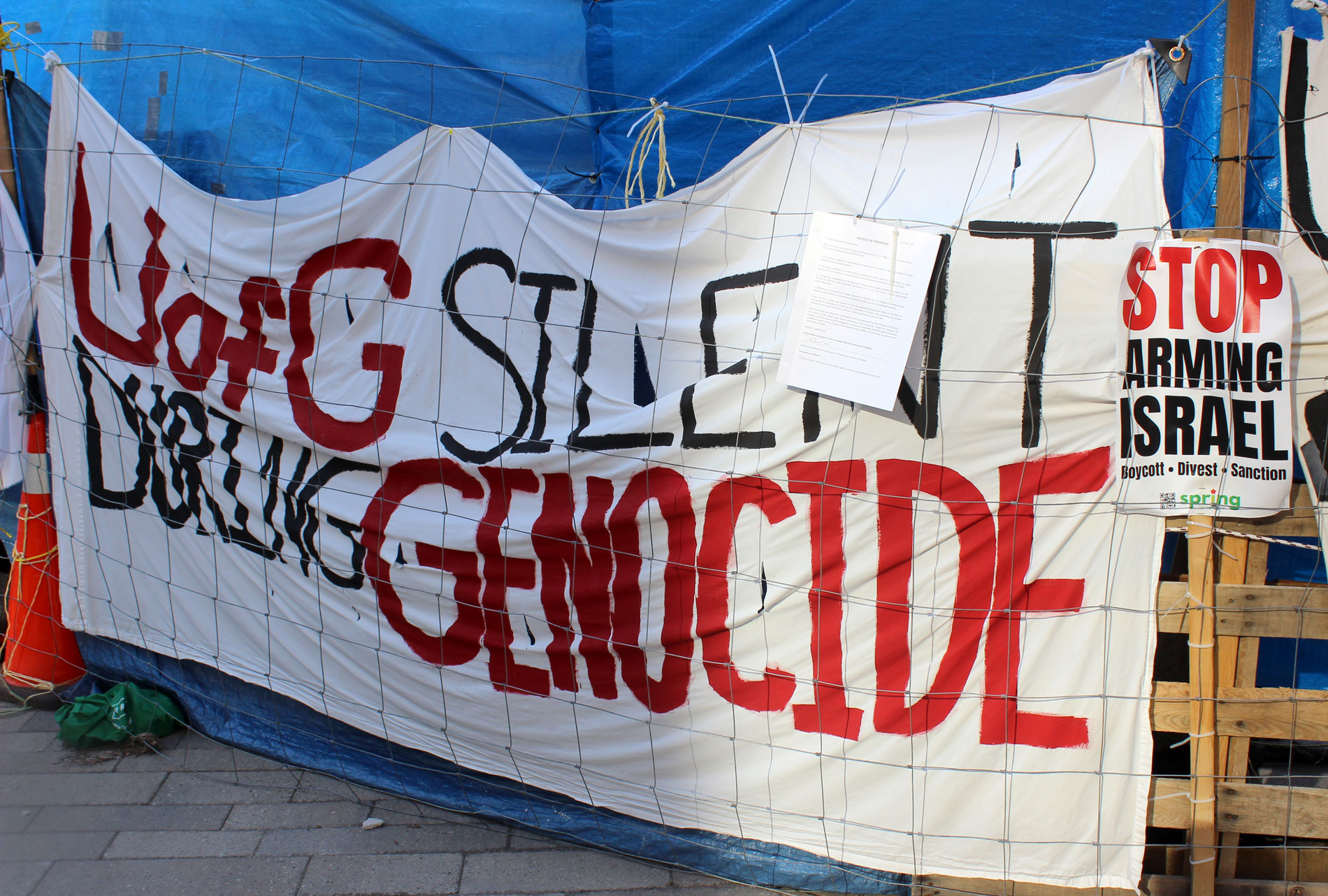
A legal notice of trespass was attached to the barricade surrounding the encampment on July 8.
“A police officer, or the occupier of premises, or a person authorized by the occupier may arrest without warrant any person he or she believes on reasonable and probable grounds to be on the premises,” the notice continues, and anyone who “does not leave the premises immediately after he or she is directed to do so … is guilty of an offence and on conviction is liable to a fine of not more than $10,000.”
U of G officials declined the Advertiser’s interview request.
Students Supporting Israel Guelph (SSIG) did not respond in time for publication. SSIG made a statement on its Instagram account expressing gratitude for Yates’ “decision to remove the illegal encampment.”
SSIG accuses U of G for Palestine of “sending a message that Jewish students are not safe or welcome on campus [and] promoting historical revisionism in their teach-ins and community events.
“Antisemitism continues to fester under the guise of ‘anti-Zionism’ and an ostensible concern for the Palestinian people,” SSIG states.
Statements of support
Several groups made statements supporting the encampment.
“Independent Jewish Voices Guelph strongly condemns the U of G administration’s threats of legal and disciplinary action against students and employees,” IJV representative Natasha Pravaz said during a June 8 press conference.
“As a Jewish organization, we feel compelled to debunk any narrative of antisemitism at the encampment,” Pravaz continued. “Jewish students have been involved in every stage of the People’s Plaza for Palestine, and our members have been inspired by all of the students’ moral integrity.
“While we have not witnessed any antisemitism, we have most certainly seen evidence of extreme anti-Palestinian and anti-Arab racism directed at the students at the People’s Plaza for Palestine. We are shocked that the university has not addressed or acknowledged these harmful actions.”
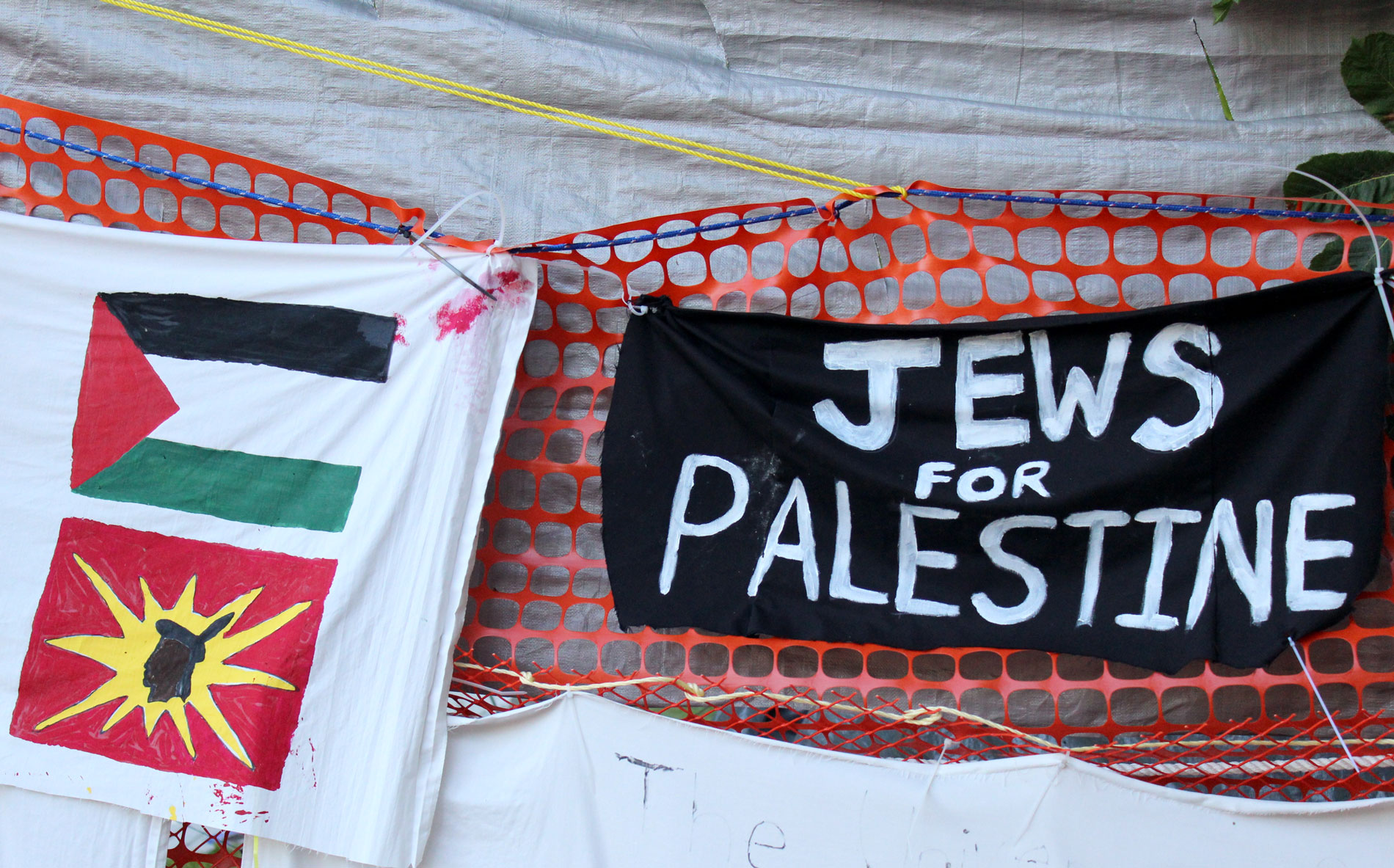
Independent Jewish Voices Guelph has repeatedly expressed support for the encampment on campus, where it hosts regular Shabbat services.
A representative of CUPE 3913 said the union “strongly condemns the threats made by [the university]. Threatening legal action … is coercive, threatening, and an escalation on behalf of the university administration.”
CUPE 3913 external vice president Kimber Munford told the Advertiser the union will continue to support members participating in the encampment, and “CUPE Ontario will provide legal support for people who are disciplined in some way for participating.”
Munford describes the encampment as a “very welcoming and positive space where you are treated like a friend the moment you walk in.”
It’s also a good space for people who are food insecure, “which many grad students are,” she added, as all are welcome to access donated food.
U of G alumnus Horeen Hassan said she feels “deeply disappointed, ashamed, and frankly outright disgusted in this institution’s behavior towards its own students – in suppressing their right to protest, surveilling them, using intimidation tactics, and now threatening both students and workers on campus with legal action.”
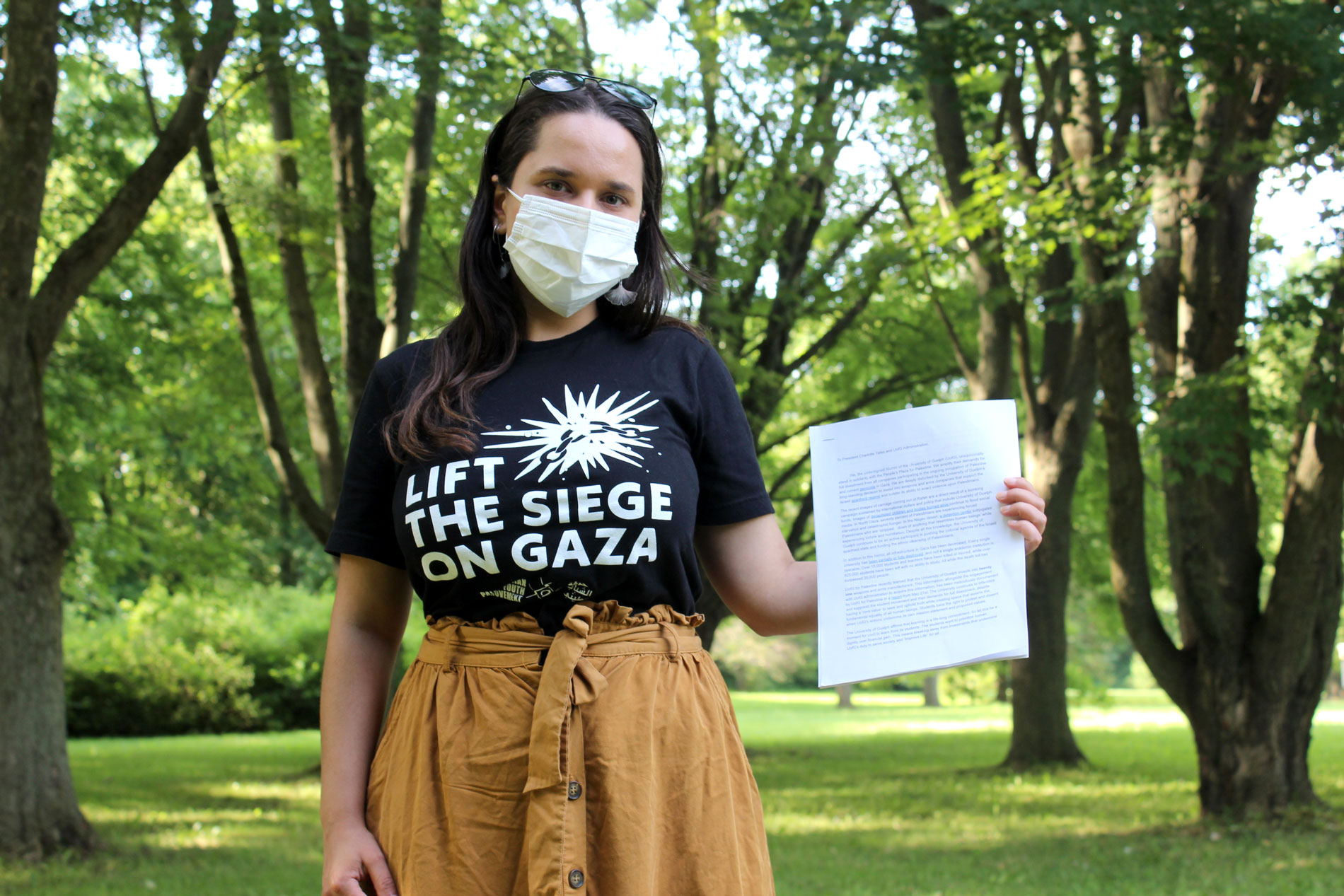
U of G alumnus Horeen Hassan, holding a letter expressing support for the studnet protestors and amplifying their demand for divestment. More than 700 alumni signed the open letter.
Hassan attempted to deliver an open letter to university admin on June 8, signed by over 700 U of G alumni expressing support and amplifying “demands for full divestment.”
But when she tried to deliver it, “we were met with police presence and ignored by U of G admin completely,” Hassan told the Advertiser.
Alumnus Fawkes Conibear said this felt “particularly frustrating” given the university solicits donations towards endowment funds from alumni – making many alumni direct stakeholders. “But they didn’t have the decency to show up and take a letter, shake a hand,” he said.
When Conibear walks around campus, he feels no pride, just “the shame of the weight of the institution because they are not divesting, and are acting so aggressively against anti-genocide protestors.”
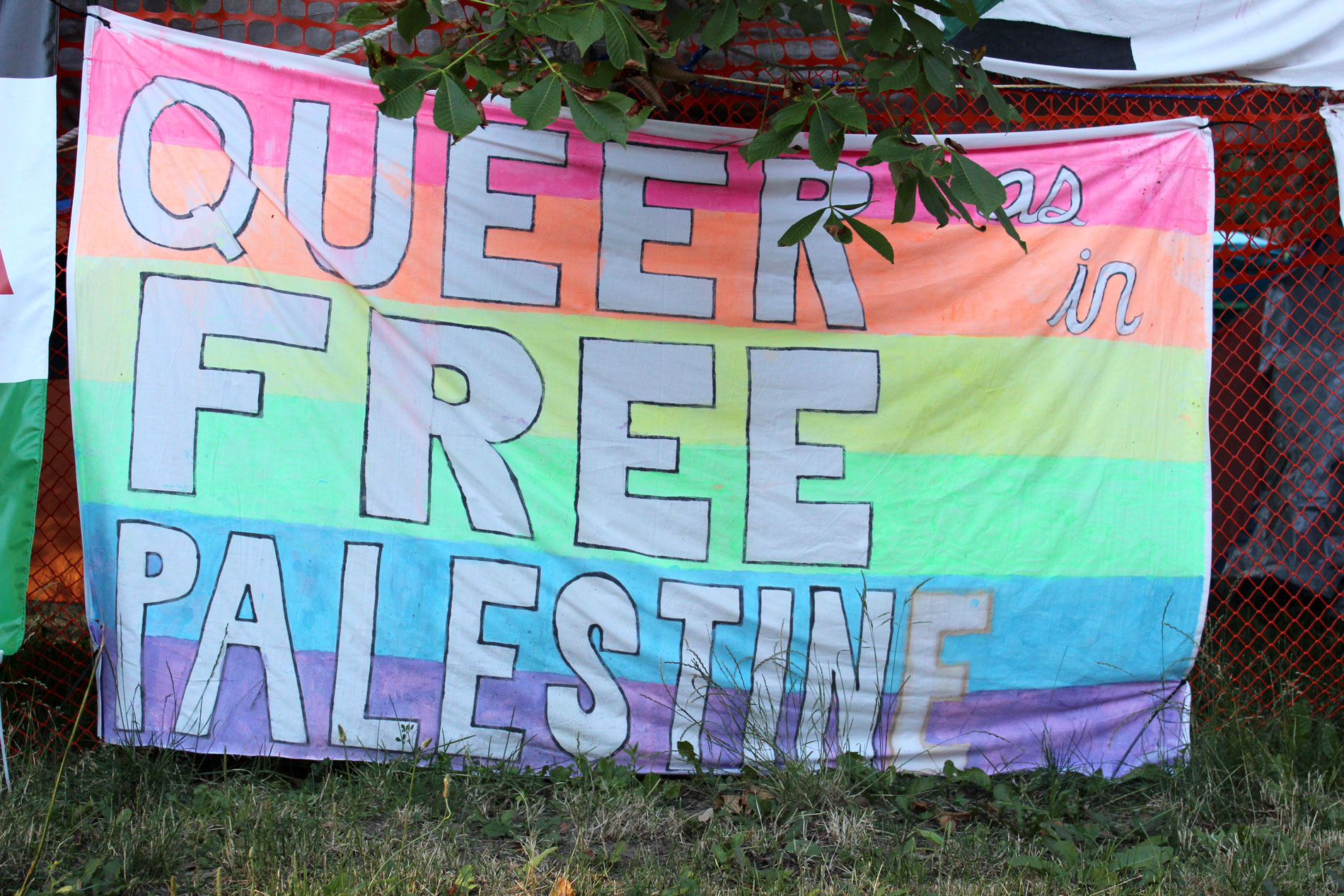
Banners hung at the U of G encampment include one that reads “Queer as in free Palestine.”
Decampment
At 7pm on June 8, U of G for Palestine announced it would decamp within seven days.
In an Instagram post, students state “This timeline will allow us to leave safely, with respect for the land where we are gathered, and without damaging or wasting the encampment materials. These will be donated to those suffering from the housing crisis in Guelph.”
The students have accepted financial donations, and reported an excess of about $4,000, which they will donate to people in Gaza through a mutual aid group called Yahya & Friends.
Protestors promise the encampment’s end does not mean they will stop pushing for divestment: “Our solidarity with Palestine, with the students, with the workers, and with the community remains unbroken.”
“The encampment was not the beginning of U of G for Palestine and it is not going to be the end,” Mirzada told the Advertiser.
“We have gained many things from our experiences here, and our tactics will keep evolving as we continue to pursue liberation for Palestine, and for all exploited and oppressed people globally,” students state. “We served as a community hub, deepening our revolutionary trust in each other and honing our organizing skills.”
The students welcome community members during the encampment’s last week on campus, to “help us pack, discuss our future direction, and participate in the refuge of solidarity that we have built together at the heart of this hostile campus.”



